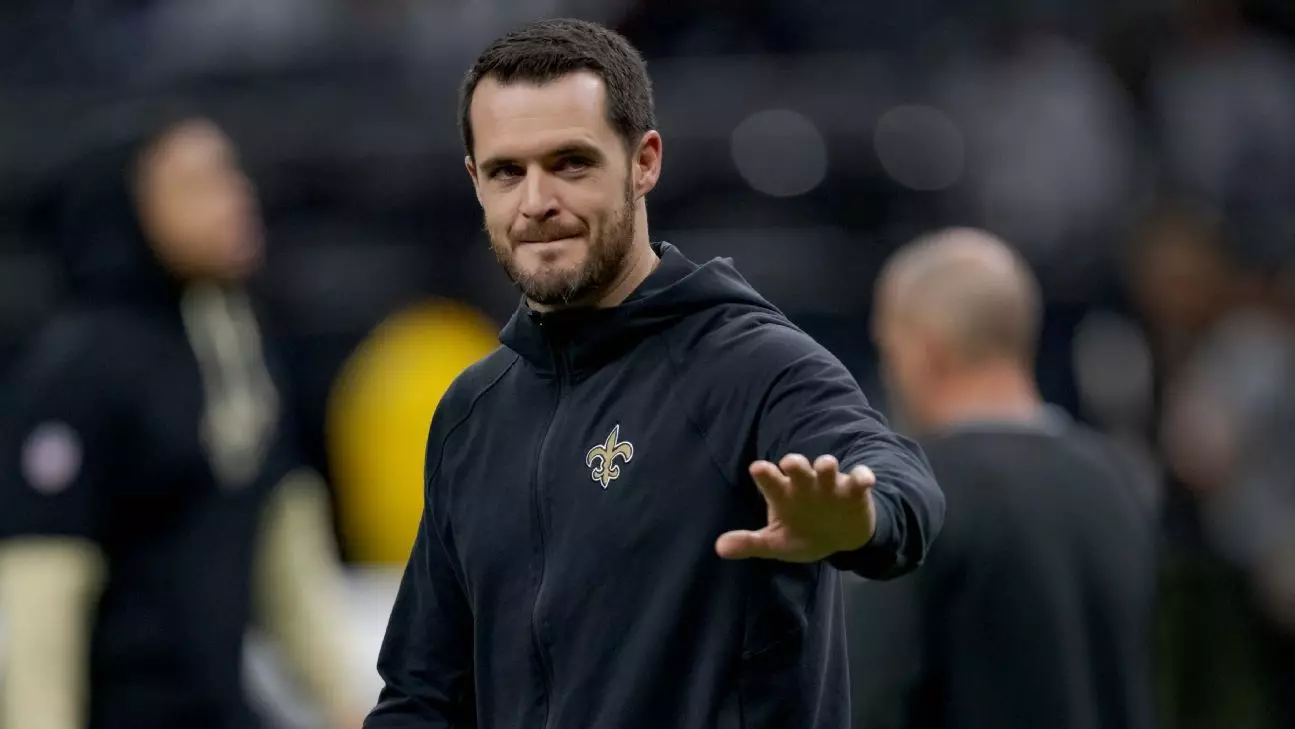The New Orleans Saints are facing a challenging turning point in their season as they prepare for a crucial match against the Tampa Bay Buccaneers. The team’s starting quarterback, Derek Carr, has officially been ruled out due to a fractured non-throwing hand, effectively ending his campaign early. This development not only reshapes the Saints’ immediate strategy but also raises questions about team dynamics and future prospects.
The Impact of Carr’s Injury
Derek Carr’s absence is a significant blow to a team that has been striving for stability in a demanding season. The injury, which he sustained in a match against the New York Giants on December 8, appeared to initially allow for hope regarding his potential return. Saints interim coach Darren Rizzi had consistently refuted claims suggesting that Carr’s season was over, emphasizing the quarterback’s determination to recover and return to the field. “I got frustrated with reports in the beginning,” Rizzi remarked, highlighting Carr’s daily commitment to rehabilitation.
Despite Carr’s dedication, the reality of professional sports is unforgiving. The medical team’s ultimate decision to rule him out underscores the recurrent challenges athletes face when dealing with injuries, even with their strongest efforts. Carr’s desire to play, especially in crucial games, speaks volumes about his professionalism and passion for the game. It also underlines the tough reality that sometimes athletes’ wishes cannot align with physiological limitations.
In the wake of Carr’s injury, the Saints must now pivot and optimize their quarterback strategy. The team’s complexity increases with Alvin Kamara listed as doubtful due to a groin injury, alongside Chris Olave’s questionable status after suffering multiple concussions earlier in the season. For the Saints, this erosion of talent due to injuries compounds their challenges, making it imperative for the coaching staff to quickly devise alternate plans for the quarterback position.
While the situation calls for immediate fixes, the question remains: how will the team adapt? Whether relying on backup quarterbacks or making tactical changes to their game plan, the Saints must navigate this tumultuous period with resilience. This adjustment period will test the depth of their roster and the adaptability of their coaching strategies.
As the interim coach, Darren Rizzi finds himself in a precarious position as he counsels the team through these changes. His repeated affirmations regarding Carr’s potential return illustrate not only an optimistic outlook but also a strategy to motivate both the players and the fan base. Even as Carr was unable to fulfill the hope of returning, Rizzi’s focus on Carr’s effort during the rehabilitation process reflects an understanding of the mental and emotional aspects of recovery.
Rizzi’s handling of the situation illustrates the tightrope that coaches often walk; they must balance player welfare with the pressing demands of competitive sports. His comments, particularly about testing Carr’s hand functionality and conducting simulated game scenarios, reflect transparent communication, which is vital in maintaining team morale. However, it also sheds light on the pressures coaches face in making calculated decisions based on incomplete information, coupled with the urgent need for results.
Moving forward, the Saints will need to fortify their game against the Buccaneers without their starting quarterback. Adapting quickly will be critical: offense strategies may evolve, and the rest of the team will need to amplify their performance to compensate for Carr’s absence.
As the season draws to a close, the Saints must remain focused not only on salvaging their current campaign but also on setting the stage for the future. The decisions made in the wake of Carr’s injury will have long-term implications, influencing roster decisions and the overall trajectory of the franchise. Whether the Saints emerge from this challenge stronger or unscathed remains to be seen, yet this moment is pivotal in determining their future path. For now, resilience and adaptability will be the defining characteristics as the team navigates this turbulent transitional phase.


Leave a Reply